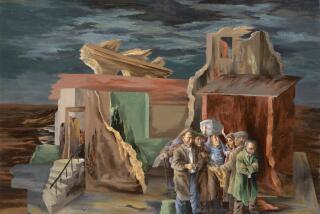Reader to Reader
- Share via
How can you place the headline “Getting Real About the Art, Politics of Norman Rockwell” over Dave Clayton’s letter containing the blatant falsehood that Rockwell “never hinted at the presence of racial conflict” (Saturday Letters, Nov. 4)?
One of Rockwell’s best-known paintings, “The Problem We All Live With,” depicts the integration of public schools in Little Rock, showing a little girl being accompanied to school by federal marshals, walking past a wall defaced by thrown tomatoes and a racial epithet. Maybe I’m reading too much into it, but I think that hints at racial conflict.
STEVE HULS
Sherman Oaks
*
As to Clayton’s remark that Rockwell’s 1943 “Freedom of Speech” represented “the kind of suffocatingly ‘realistic’ art promoted by oppressive totalitarian regimes,” one can only wonder what inspires such bitterness toward an artist who contributed so much toward the effort to sell war bonds to defeat a totalitarian government that would have prevented Clayton from freely expressing his opinions today.
While Rockwell’s art may have been largely inspired from the common life of small-town New England, that doesn’t make it any less valid as an art form, or less worthy of our admiration or respect.
RANDELL L. WILKINSON
Tustin
More to Read
The biggest entertainment stories
Get our big stories about Hollywood, film, television, music, arts, culture and more right in your inbox as soon as they publish.
You may occasionally receive promotional content from the Los Angeles Times.










